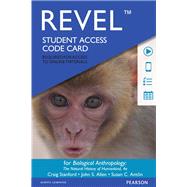Present a rich overview of biological anthropology, from early foundations to recent innovations
REVEL™ for Biological Anthropology: The Natural History of Humankind combines comprehensive coverage of the foundations of the field with modern innovations and discoveries, helping students understand, and get excited about, the discipline. Because the authors conduct research in three of the main areas of biological anthropology — the human fossil record (Susan Antón), primate behavior and ecology (Craig Stanford), and human biology and the brain (John Allen) — they offer a specialist approach that engages students and gives them everything they need to master the subject. REVEL for the Fourth Edition continues to present traditional physical anthropology within a modern Darwinian framework, and includes coverage of contemporary discoveries to highlight the ever-increasing body of knowledge in biological anthropology.
REVEL is Pearson’s newest way of delivering our respected content. Fully digital and highly engaging, REVEL replaces the textbook and gives students everything they need for the course. Informed by extensive research on how people read, think, and learn, REVEL is an interactive learning environment that enables students to read, practice, and study in one continuous experience — for less than the cost of a traditional textbook.
NOTE: REVEL is a fully digital delivery of Pearson content. This ISBN is for the standalone REVEL access card. In addition to this access card, you will need a course invite link, provided by your instructor, to register for and use REVEL.











